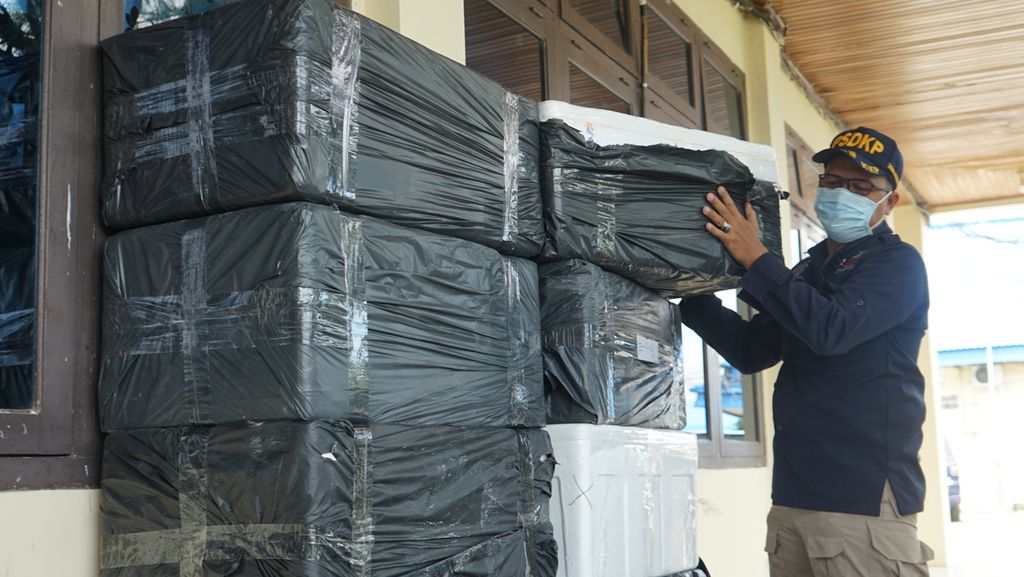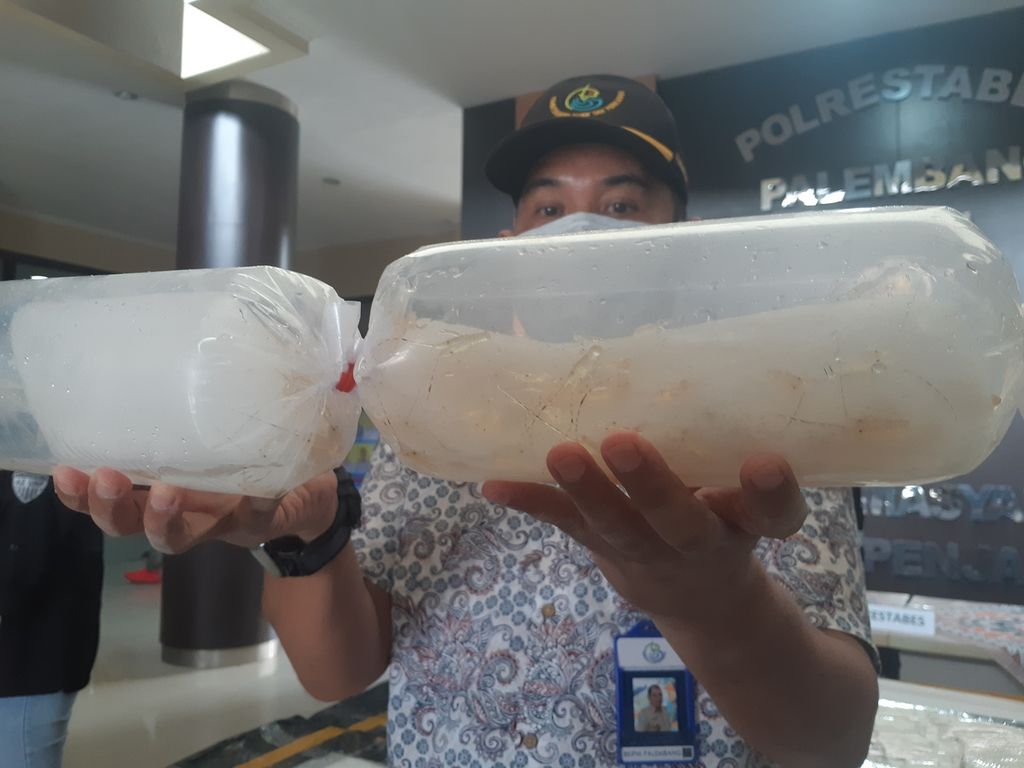The policy plan to export clear lobster seeds has once again sparked a public polemic. Concerns have arisen regarding the sustainability of lobster cultivation in Indonesia.
JAKARTA, KOMPAS — The government ensures that the reopening of exports of clear lobster seeds for overseas cultivation will be accompanied by the development of domestic lobster cultivation. However, a number of groups believe that the government’s move will hit lobster cultivation in the country and, on the contrary, benefit lobster cultivation businesses abroad.
Draft Regulation of the Minister of Maritime Affairs and Fisheries concerning the Catching, Cultivation and Management of Lobsters (Panulirus spp), Crabs (Scylla spp), and Crab (Portunus spp i>) is now entering the public consultation stage. The revised regulations include reopening the export of clear lobster seeds through an investment cooperation scheme. Previously, the export of lobster seeds was prohibited.
The open and close regulations for the export of clear lobster seeds have been implemented several times. From Kompas‘s records, the government closed the export of clear lobster seeds in 2015-2019, then opened it again in 2020. In 2021, the export of clear lobster seeds was closed and this year the export permit has the opportunity to be opened again. Lobster is one of the five leading cultivated fisheries commodities promoted by the government in a blue economy based work program.
Executive Director of the Center for Maritime Studies for Humanity, Abdul Halim, suggested that the government should refrain from being tempted to export crystal clear lobster seeds wrapped in foreign investment narratives for lobster cultivation within the country. The government needs to focus on studying the stock of crystal clear lobster seeds and work with local growers in each province to cultivate and raise lobster.
“The economic and environmental benefits of cultivating lobsters domestically can be better felt by cultivators rather than exporting transparent lobster seeds to Singapore, Vietnam, and China,” he said when contacted from Jakarta last weekend.
Halim added that the opening of the clear lobster seed export would only benefit foreign investors. The transfer of technology by foreign investors is doubtful to be realized. From the aspect of downstreaming, the program for breeding and cultivating clear lobster seeds domestically is threatened to be stopped due to the massive migration of cultivators to catch clear lobster seeds. “In the end, the exploitation of clear lobster seeds will become more rampant and we will lose our seed stock,” he said.
Comparison
Advisor of the Association of Indonesian Marine Cultivation (HIBILINDO), Effendy Wong, revealed that Indonesia’s lobster cultivation is still lagging behind Vietnam despite Vietnam relying on Indonesia’s supply of transparent lobster seeds. Indonesia’s lag is due in part to technological limitations.
The lobster cultivation techniques utilized in Lombok’s production center are deemed to be nearly 20 years behind those of Vietnam. Vietnam possesses more advanced cultivation methods and easier feed options, including small fish and shellfish, despite the fact that small fish are predominantly obtained through the utilization of tiger trawl equipment, which damages the environment’s carrying capacity.
Meanwhile, the traditional way of cultivating lobsters in Indonesia with limited quality of feed results in slow lobster growth. Some lobster cultivation centers are located far from a sufficient supply of feed sources, such as shellfish.
“The advantages of technology and ease of feeding in Vietnam make lobster cultivation more efficient. To achieve a harvest size of 150 grams, Vietnam only takes six months, while Indonesia takes eight months,” he said on Sunday (15/10/2023).”

Inequality also occurs from a logistical aspect. Vietnam’s geographic location is closer to the main lobster market, which is China. For illustration, the cost of transporting lobster from Vietnam to Shanghai (China) is Rp 10,000 per kilogram (kg), while the cost from Lombok to Shanghai reaches Rp 80,000 per kg. The excellence of logistics is considered to have helped Vietnam dare to buy seeds from Indonesia at a higher price so that more seeds can be supplied to the country.
According to Effendy, the method of addressing Indonesia’s lag in lobster cultivation by opening the exportation door for clear lobster seeds is deemed inappropriate. Furthermore, there is no guarantee that local cultivators can obtain enough seeds at an affordable price. Additionally, there is no obligation for foreign investors to establish cultivation sites in Indonesia with a certain area and technology transfer.
“If we only develop small-scale land, would foreign investors be willing to fully transfer technology? As a competitor country, there is certainly an interest in preventing Indonesia from advancing in lobster cultivation as a seed supplier. The export tap of seeds will only make it difficult for lobster cultivation in Indonesia to advance,” he added.
The Head of the Center for Coastal and Marine Resources Studies at IPB University, Yonvitner, expressed a similar opinion. The government needs to focus on developing lobster aquaculture within the country first in order to improve the competitiveness of domestic farmers. The opening of the export tap for lobster seeds is feared to hit the competitiveness of farmers. The price of lobster seeds will gradually increase as seed catchers will sell them based on export price standards. As a result, local fishermen will find it difficult to obtain these seeds.
“The expensive seed prices, high operating costs, and long cultivation time will slowly kill domestic lobster farming because it will become increasingly difficult to purchase clear lobster seeds,” he said.
Yonvitner added, Indonesia’s advantage over clear seed lobster resources should be seen as a potential that needs to continuously improve competitiveness by learning from Vietnam’s management and technology. In this way, Indonesia can excel in managing from seed to cultivation, production processes, and markets.
Sovereignty
Chairman of the Muhammadiyah Central Board Anwar Abbas revealed that the Muhammadiyah Executive Board had previously advised the Ministry of Maritime Affairs and Fisheries to not export clear lobster seeds, but instead to cultivate them to the appropriate size for consumption to create greater added value and have an impact on the welfare of cultivators and fishermen. With lobster cultivation, the country’s foreign exchange earnings will be much greater.
They are highlighting current policies, such as the re-opening of transparent lobster seed exports and the controlled capture of fish that sea-ravage, which give the impression that the government is no longer advocating for the people, but for the interests of business owners. The livelihoods of farmers and fishermen are feared to become even more difficult and cornered.
“The country is already pawned. The government is no longer fighting for the people, but rather fighting for the desires of capitalists,” he said during the Fishermen’s Forum “The Fate of Fishermen Swinging from Measured Fish Capture Policies”, which was held by the Muhammadiyah Central Leadership Empowerment Assembly on Saturday (14/10/2023).
Minister of Maritime Affairs and Fisheries from 2014 to 2019, Susi Pudjiastuti, expressed in the same forum that the President’s vision and mission remains the same until now, which is to make the sea the nation’s future. The main pillars to achieve this vision are sovereignty, sustainability of resources, and welfare of fisheries entrepreneurs. “We must own and control the sea. Without sovereignty, planning anything is useless because others control our resources,” she said.
Susi also highlighted the arrest and sale of clear lobster seeds overseas. The collection of germplasm poses a threat to the sustainability of lobster resources. Ironically, seed trading actors are often suspected of bribing authorities, figures, politicians, and academics to justify the capture and sale of lobster seeds. “(Authorities) are often used to justify fishing mafias to seize our extraordinary natural resources,” she said.

Head of Legal Bureau of the Ministry of Marine Affairs and Fisheries, Effin Martiana, stated in a press release that the regulation of lobster cultivation prioritizes the development of cultivation both through in-country cultivation schemes and overseas. Regarding the export of clear lobster seeds for cultivation abroad, the investment scheme requires investors to conduct cultivation in Indonesia.
In addition, there are several other requirements for the export of clear lobster seeds, including the existence of an intergovernmental agreement with the government of the investor’s home country and the obligation to establish a limited liability company under Indonesian law. Investors are also required to work with the public service agency for aquaculture and obtain seeds from them, as well as release 2 percent of clear lobster seeds during each harvest.
“In the regulation of investment for the cultivation of transparent lobster seeds, there are strict procedures aimed at technology transfer processes to further develop domestic cultivation,” said Effin last weekend.
Effin stated that the quota for catching transparent lobster seeds is determined by the Minister of Maritime Affairs and Fisheries based on the potential of available resources and the allowable catch amount (JTB), as well as the level of utilization of fishery resources. The catching of transparent lobster seeds must have a business license and a multi-level reporting system to enable monitoring.
Source: https://www.kompas.id/baca/english/2023/10/15/en-ekspor-benih-bening-lobster-untungkan-asing

Add a Comment